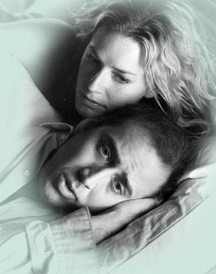Codependents: Elisabeth Shue and Nicolas CageNicolas Cage and Elisabeth Shue drown their sorrows
By Don Hines
Billed as "a love story," Leaving Las Vegas is a tragic triangle: Sera (Elisabeth Shue) loves Ben (Nicolas Cage); Ben loves the bottle. Before the titles roll, Ben has lost his job along with the desire to do anything other than drink himself to death in Las Vegas, home for last shots. The pretitle scenes show Ben bumming money off of a fellow studio executive at a West L.A. restaurant and awakening from a blackout on the kitchen floor.
Five minutes into the film, Ben's worn out his welcome with everyone in L.A., but not with the audience--since he's portrayed by Cage, our least guileless actor, whose hangdog earnestness makes memorable many dark comedies (Moonstruck, Raising Arizona, Amos and Andrew). Here he's dark but neither funny nor cute; he's sincere only when he says, "Don't ever ask me to stop drinking" to Sera, a character once called hooker with a heart of gold, now known as the codependent. Shue bravely allows her all-American beauty to be battered by bad lighting and makeup; she's not pretty on the inside.
Mike Figgis (Internal Affairs) has directed the greatest film about alcoholism--thus the saddest. It is devoid of the deodorized romanticism of skid row in Bukowski's Barfly. Ben starts at the bottom and gulps downward. There's no moral to the film, no punk happy ending as in Sid and Nancy, in which the junkie lovers are freed by death. As in no other film about addiction, Ben affably states from the outset that booze comes first; everything else (including Shue's addled love) is tied for last. Unlike Days of Wine and Roses, in which Jack Lemmon is pert, or The Lost Weekend, in which Ray Milland is eloquent, Ben's imagined charm is viewed through a camera lens not the least bit intoxicated by his shtick; only Cage's genius allows such a repellent creature to seem likable.
Figgis offers emotional respite through a beautifully confluent score, high-gloss photography relying on Vegas neon for illumination, and a camera placed at a distance when Cage is at his worst, such as an overhead shot in a casino during which Ben erupts after being denied his dozenth free drink. Shue's misplaced love evokes sympathy; Cage's inexorable reach down for one more drink evokes pity. The film's a perfectly touching terror.
[ Movies Index | Metro | Metroactive Central | Archives ]

